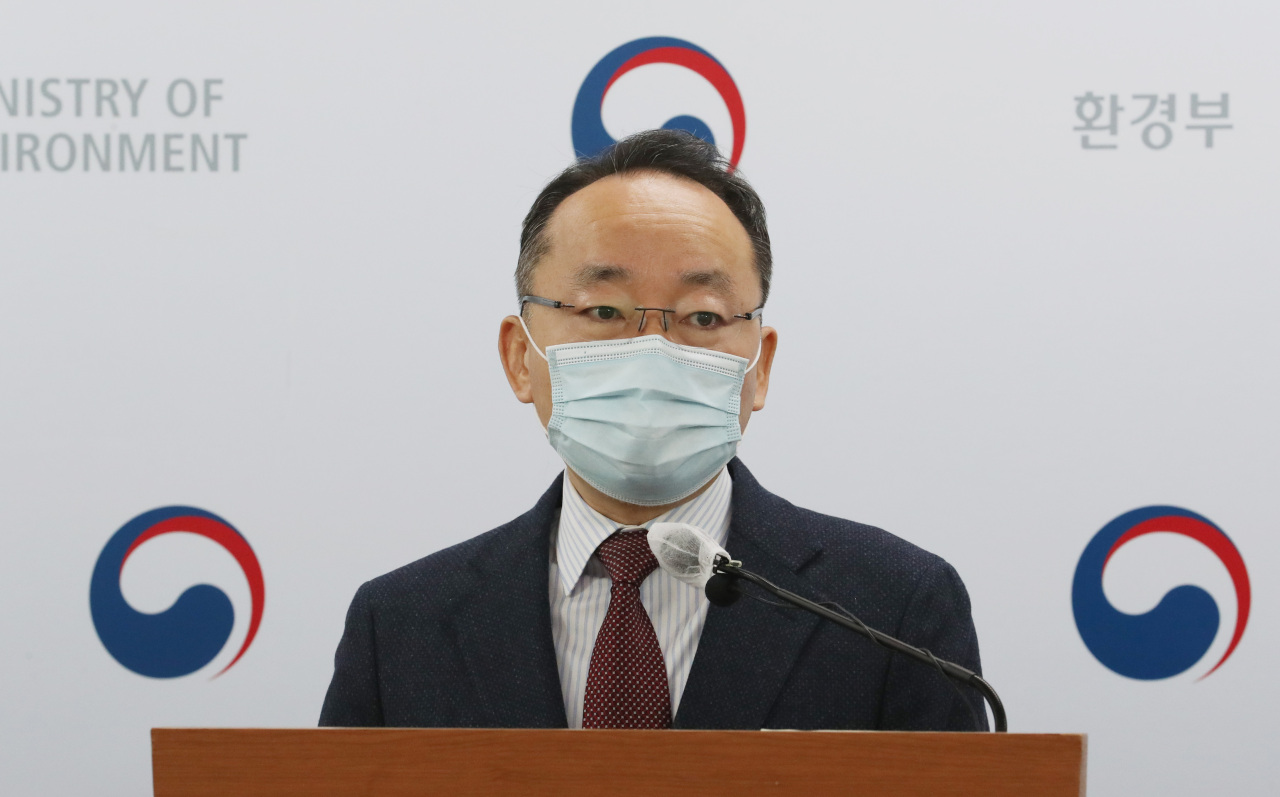 |
Hwang Suk-tae, a senior official at the Ministry of Environment, speaks during a press briefing Tuesday. (Yonhap) |
South Korea this year will prepare a road map to achieving its carbon-neutrality goal of 2050 while increasing the share of renewable energy sources and promoting the use of eco-friendly vehicles.
The Ministry of Environment said in a press briefing Tuesday it will prepare a detailed plan and set of initiatives to help Korea become carbon neutral by 2050. The idea of achieving net-zero carbon dioxide emissions has risen as a priority on the global agenda since the Paris Agreement took effect in 2016.
The plan also includes achieving Korea’s nationally determined contribution under the Paris Agreement to cut its greenhouse gas emissions 24.4 percent by 2030 from the 2017 level.
The ministry said it will prepare a detailed plan by June to cut greenhouse gas emission levels in consultation with representatives from industries, civic groups and local governments. The plan will incorporate 11 out of 31 policy initiatives announced by the government in December.
One of the goals to be included in the 2050 plan is transitioning all vehicles in Korea from fossil fuel vehicles to eco-friendly ones, which the ministry said will promote through improvements in available car options and expanded infrastructural support.
For this year, the ministry plans to have Korea run a total of 300,000 eco-friendly vehicles by mandating public entities to purchase such cars and providing more infrastructural support. The ministry plans to add eco-friendly car charging options at rest stops and gas stations already in use.
The ministry also vowed Tuesday to install more solar panels and push forward additional energy projects with renewables with a goal to put government entities at the center of promoting a circular economy.
The government will install solar panels at five water dams to generate more power while running eight projects focused on drawing power from heated water. The ministry added it will support environment infrastructural facilities like water purifying centers to install renewable energy production devices.
To reduce the amount of waste produced at industrial sites, the ministry plans to enforce stricter rules on using disposable materials and help corporations set goals in cutting the amount of waste produced at their sites.
The ministry said it will prepare a measure that will increase the share of responsibility for waste producers and introduce it as an official policy in 2022. A separate road map toward a circular economy will be announced in the second half of this year, the ministry added.
And in concern of climate change, the ministry said it will run more research projects to analyze its eco-friendly projects concerning the global phenomenon, using the results as grounds for additional policies to be introduced next year.
The research results will also help Korea better prepare for both flash floods and droughts, the ministry said. Korea suffered its longest monsoon season last year with devastating damage from floods and typhoons -- a trend that experts have said is likely to continue for years to come.
The ministry emphasized it will strengthen ties with other global agencies and committees to open more collaborative projects and take the lead in global climate change initiatives.
By Ko Jun-tae (
ko.juntae@heraldcorp.com)








![[Today’s K-pop] Blackpink’s Jennie, Lisa invited to Coachella as solo acts](http://res.heraldm.com/phpwas/restmb_idxmake.php?idx=644&simg=/content/image/2024/11/21/20241121050099_0.jpg)